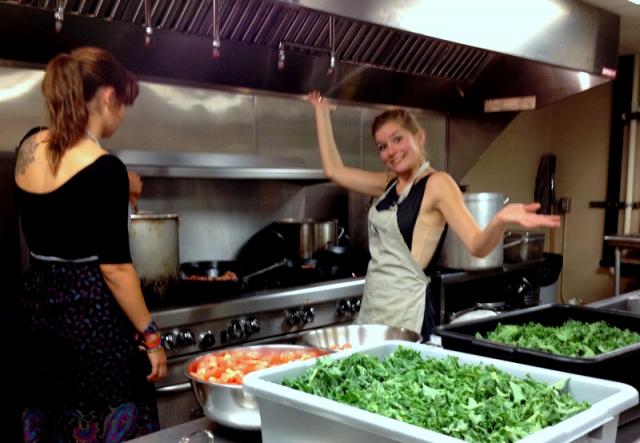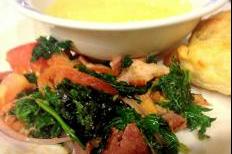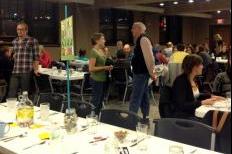







Foodies rejoice, Food Day 2013 is here. On Thursday, October 24, Americans across the country will unite to celebrate the grassroots movement for sustainable food and education. UW-Madison is embracing the national celebration by hosting the first Real Food Week from October 21-25 with the ultimate goal of improving the sourcing of food on campus, according to Slow Food UW.
The week consists of on-campus lectures, panel discussions and other food-related events to discuss the benefits of eating real food and raise community awareness. As defined by Slow Food UW, the four criteria for real food are local and community-based, fair, ecologically sound and humane.
The first Real Food Week event took place on Monday at 6:30 p.m. at The Crossing where Slow Food UW hosted a special Family Dinner Night, designed by Executive Chef of Weary Traveler Free House Joey Dunscombe, and panel discussion.
For $5, community members feasted on a three-course meal planned by Dunscombe, a logical role model for Real Food Week since his restaurant already sources many products and ingredients from local businesses like Underground Meats and Hook’s Cheese Co.

With the progression of each course, the five panelists, Jack Kloppenburg, Sarah Lloyd, John and Dorothy Priske and Axel Adams, spoke about the changing food environment and the importance of becoming an active community member in the food sustainability movement.
“UW has a really rich history in sustainable agriculture,” said Adams, the current garden director for F.H. King.
As an undergrad at UW-Madison, Adams became involved with F.H. King early on and has held his current position for two-and-a-half years. Adams seems positive about the schools success in pursuing sustainable food practices:
“In terms of getting local food on campus, F.H. King has been trying to get that on the table for a long time ... I think that the tide is changing and there is more awareness about food mileage. I think that in years to come more and more local food will be included on campus.”
Lloyd agreeed with Adams’s positive outlook on food sustainability in Madison:
“There is so much good energy around food and farming and it feels really great,” she said.
As Interim General Manager of Wisconsin Food Hub Cooperative, Lloyd helps connect local farmers with buyers and aides in the distribution of the farmer’s produce to larger institutions like schools and grocery stores.
“We would love to be shipping product into UW-Madison,” said Lloyd.
The Food Hub has the capacity to work on both small and large scales, according to Lloyd, “The week leading up to labor day we shipped 17,000 dozen ears of sweet corn to Roundy’s from our three sweet corn growers in our co-op.”
Although the Food Hub alleviates some of the pressure of finding consumers and distributing local produce, Lloyd said that new food safety regulations make it increasingly difficult to distribute local food. Some larger distributers require a 10 million dollar liability insurance policy, according to Lloyd, and the Food Hub is one organization that can carry this policy for farmers.
Owners of Fountain Prairie Inn and Farms, John and Dorothy Priske provided a farmer’s perspective on the issue of sustainable food and sourcing. The Priskes were not always sustainable farmers, but they changed their production process when they saw the effect certain chemicals had on the environment and animals. In 2004, the Priskes were invited to the first Slow Food event in Italy that hosted 5,000 people from 120 different countries, according to John Priske.
“You have to be what you want the world to be,” he said.
The Priskes encouraged students and community members to participate in the sustainable food movement and other food organizations instead of being passive supporters.
Jack Kloppenburg, professor of Community and Environmental Sociology, director of UW-Madison’s Greenhouse Learning Community and founder of REAP Food Group, continued the Priskes message to become more involved in the food community.
“The system doesn’t change by itself ... it requires more of you to be sustainable and to be just and to be good,” said Kloppenburg.

“Vote with your fork ... and vote with your votes,” he said.
At the end of the panel discussion, students and community members were invited to sign a petition that would require UW dining halls to sign a contract to commit 20 percent of its food budget to real food.
Real Food Week is sponsored by many organizations including Slow Food UW, F.H. King Students for Sustainable Agriculture, The Office of Sustainability, Wisconsin Union Directorate, the Department of Community and Environmental Sociology and University Health Services.
To find out more information about other Real Food Week events taking place in the Madison community go to the Slow Food UW or F.H. King websites.
|
|
|
Welcome to the Madison Commons, a website designed to provide news and information about all of Madison's neighborhoods and a crossroads for the discussion of community issues. The name comes from the idea of a village commons, a place for news, talk, debate, and some entertainment, too, that's open to everyone.
All rights reserved. Read more about the Madison Commons and its partners.

